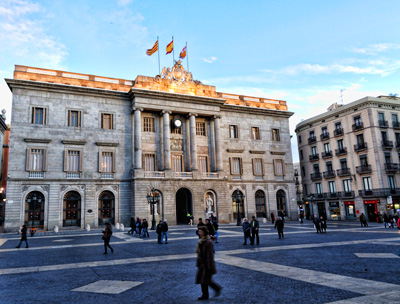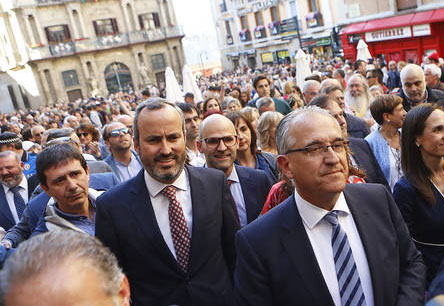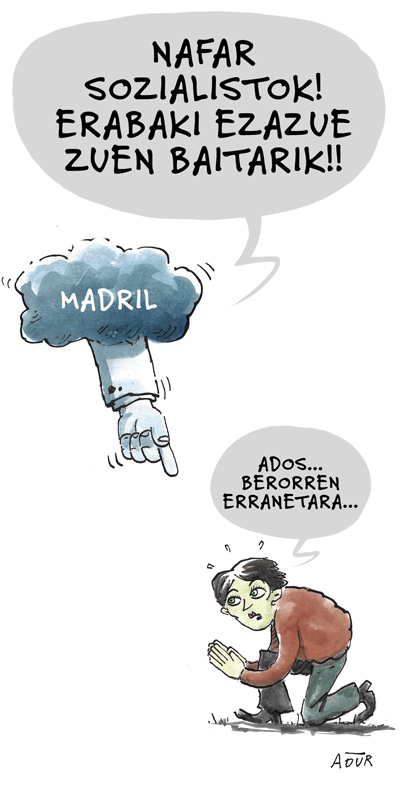26 May: Prepared for the invasion of the unionist right in Navarre
- We are still in the political hangover of the general elections in Spain, but one eye is already in the municipal and foral elections on 26 May, especially in Navarre. Competition in the old kingdom has been intense and demanding and it remains to be seen whether the 2015 change will last, whether another exchange rate will prevail or whether the corralito regime returns. All the options are possible.

Still up to the wave of the general elections, with the data of 28 April the majority supporting the current government is confirmed. Reading the elections in their broad context, however, continues to exist, especially in view of the fact that in general and foreign elections there is a different vote. Historically, at least, that has been the case.
You're going to be comedian to do that, but if you meet a number of requirements, it's possible -- one, and perhaps most importantly, that Geroa Bai greatly improves your results; that EH Bildu and We can keep your end results, and maybe improve a little -- that you lower your right and that the PSN goes down a lot. Is all this possible? Miracle? It's not easy, but it's possible, as it happened in 2015. The most important fact of the time was that for the first time it was possible to equate the forces of change with those of UPN-PSN. The eruption of Podemos was key for the balance to rise a change and also the distribution of the right, that if Citizens had obtained 200 more votes there would be no change of government. Navarra Suma wants to avoid it, but that alone does not solve everything.
UPN and PSN fall
The right has not added: Navarre Suma has now obtained 107,000 votes, more than 17,000 from Vox, an increase of 124,000 votes. In 2016, the Navarrista right won 127,000 votes, so given that the turnout has risen by almost 9%, it has now been reversed. However, the number of votes is very high. Over the past 20 years, UPN and the other parties have recorded between 92,000 and 139,000 votes, although the trend is down. However, even if one point of the current results is reduced, it can be easily placed between 90.000-100,000 votes. Now, however, Vox comes on its side and you will have to see how it affects UPN. It would be logical for many of them to support Navarre Suma so that “those of the Popular and Independence Front” – in their language – do not get the Government of Navarre again. We'll see.
Javier Esparza has reason to be concerned, but his biggest problem in reaching the government – only by the votes – is not its results, but those of the PSN, where he has the most difficulties. The PSN has gone from 45,000 to 91,000 votes in the last two decades, but in recent years with a strong setback: 74,000 votes in the 2007 elections, 51,000 in 2011 and 45,000 in 2015. You might think that many of the votes you have now received are borrowing to face the neofranchist right, which is hard to imagine, but the story of the results shows that there is always a lot going down from the Spaniards to the Navarros. This time it will not be so easy, as the PSOE was invented that these votes were called a month before the municipal elections, in the hope that the April Txanpa would influence those of May. It could have been the other way round, but as the move has gone well, now Pedro Sánchez has the wave in favor and it is to be seen to what extent he will support María Chivite in her candidacy. And in any case, it is not easy to imagine here Navarre Suma -PSN, when they are stabbing in Madrid.
Another factor that is often opposed is the higher turnout in the general elections and with better results; in the forals, the turnout drops from 4-5 points, which favors the Basque parties. In other words, for a group of citizens the Parliament of Navarre is not as important as the Spanish Parliament and it passes. Historically, the PSN is the most impaired aspect of this unwritten rule.
We can be key again.
We can and Left-Ezkerra are other keys. Despite having gone down a lot, they have now achieved a very good result between the two – United We Can –: 68,000 votes, but they will be distributed on 26 May. This is an incomprehensible decision, both from the point of view of the Left and the point of view of change, which can be decisive. With the current outcome, the presidency of the government would be in the hands of the forces of change. In 2015, Podemos was the key force that enabled change, and now it can also be. The parties of change fear the split of Podemos, but the results of Sunday leave the door open to hope, among other things because there is no history that says whether those votes go down a lot or not. In any case, it might be thought that some of them could go to EH Bildu, but it is not easy either, as the Abertzale coalition is in its highest positions.
EH Bildu in good position, Geroa Bai very close
Of the parties to change, Uxue Barkos coalition has the most difficult knot to liberate: The 53,000 votes of the 2015 foral elections led him to the presidency of the foral government, but in the generals of December 2016 he won 14,000 votes and now 22,000. Very little, given that the general elections in 2011 gave him 42,000 votes and a deputy for Bizkaia and Gipuzkoa. The forces of change, and in particular Geroa Bai, hope that last Sunday’s result will change a lot on the 26th and that Barkos’s management during the legislature will give them many votes. That would be logical and desirable, but the truth is that it needs 31,000 more votes to match, at least, the results of the 2015 forced elections. A difficult challenge, but possible from the historical point of view of Uxue Barkos, both by the results obtained in Nafarroa Bai – 61,000, 62,000 and 777,000 votes – and by Geroa Bai – 42,000 and 53,000 votes.
EH Bildu is in a much better position, rising from 31,000 votes in 2016 to 46,000 in 2017. They are the best results of the sovereign left after Euskal Herritarrok (1999) and Amaiur (2011). His electoral corps is historically fairly faithful, despite having had an irregular trajectory from the 2011 summit to the present day.
Other changes?
The aspects of the change have been satisfied with what has been done and have shown a desire to repeat the experience. But no other change can be ruled out, much less following the enormous results of the April SNP, which are pointing to a setback. The PSN has stated on more than one occasion that he sees a government that has as its axis the PSN and that of Geroa Bai. We can and Left-Ezkerra could also be comfortable on that stage. And what goes down is EH Bildu, which is the red line of the PSN. However, obtaining the absolute majority among the three forces is a scourge and, therefore, in this scenario it will also be up to EH Bildu to decide or a parliament that allows a government UPN-PSN or that supports the government PSN-Geroa Bai-Bay-Ezkerra. More scenarios are also possible, but it would be to open too many doors without yet having the results in hand. In any case, the only thing that is clear is that, as in 2015, those with heart problems will have to be careful on the night of 26 May.
In the drafting of these lines, the new quadripartite of Navarra has just reached a programmatic agreement. The quadripartite is new, because the PSN enters and leaves EH Bildu. They also agreed that the Socialists have vetoed those of Bildu, who have ensured that they are not... [+]
In the summer of 1977, thousands of people from the Freedom March entered the camps of Arazuri, in Pamplona, in columns and filled with ikurriñas, shouting that Navarre is the Basque Country. Twenty years later I had the opportunity to interview Juan Cruz Alli, and in... [+]
Ada Colau will remain in the position of Mayor of the Catalan capital, in a context difficult to imagine before the election campaign: With the eight votes in favour of the PSC, the three votes in favour of the candidature of former Prime Minister Manuel Valls, supported so far... [+]
On 19 June, while he was in the constitutive session of the new Parliament of Navarre, on the front sidewalk, there were about 25-30 men behind a banner. They weren't relatives of the prisoners, they weren't workers of a company in crisis, they weren't even Euskaltzales worried... [+]
What does it mean to achieve good results in the elections? Ideologically, parties that coincide with the status quo tend to achieve institutional power and, furthermore, prefer to submit to it all political analyses. In the elections, what is well done is rewarded. And it's... [+]
What affects us when we vote? What ideas, intentions and emotions are there? Veiled political thoughts or elaborate considerations that reflect deeply and then unfold deep roots in our thinking? That we do not know where we have received the beliefs that we collect, as the... [+]






















